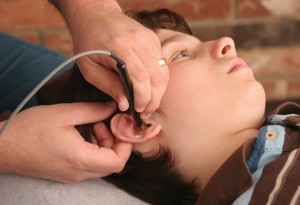Natural Healing Options for ADHD
Coping with a child who exhibits symptoms of Attention Deficit Hyperactivity Disorder (ADHD) is a challenge. Ask parents who are beginning to suspect that the exasperating behavior displayed by their child is not “normal”. What can a parent do to address these stressful issues? Unfortunately, there is no single test for ADHD, but there are some specific symptoms that should lead a parent to consult a professional.
Inability to Focus
- Lacks attention to detail
- Makes careless mistakes with school work
- Toys, school assignments, pencils, books, or the tools needed for tasks or activities seem to get “lost” easily
- Inability to listen when spoken to directly
Hyperactivity
- Constant fidgeting with hands or feet or squirming in the seat
- Runs about or climbs excessively or in inappropriate situations
- Has difficulty playing quietly or engaging in leisure activities
- Often “on the go” or as if “driven by a motor”
- Talks excessively
Impulsiveness
- Blurts out answers before questions have been completed
- Has difficulty waiting to take a turn
- Interrupts or intrudes on others (for example, impulsively jumps into conversations or games)
 If you observe six or more of these behaviors, your child may have ADHD. For a definitive diagnosis, these symptoms must be out of the normal range for a child’s age and development. Every child suspected of having ADHD should be carefully examined by a doctor to rule out the possibility of other conditions or reasons for the behavior.
If you observe six or more of these behaviors, your child may have ADHD. For a definitive diagnosis, these symptoms must be out of the normal range for a child’s age and development. Every child suspected of having ADHD should be carefully examined by a doctor to rule out the possibility of other conditions or reasons for the behavior.
ADD and ADHD
Attention Deficit Disorder (ADD) and ADHD are the most commonly diagnosed behavioral disorders of childhood before the age of 7 years. ADHD is diagnosed much more frequently in boys than in girls, and a combination of medication, behavioral interventions, and educational accommodations are commonly used in western medicine. The most commonly used ADHD drugs are the central nervous system stimulants and antidepressants, which can heighten an individual’s energy and alertness. However, these psychotropic medications can have adverse side effects, ranging from physical symptoms (i.e., skin rash, difficulty breathing) to behavioral changes (i.e., irritability, aggression) to severe reactions possibly resulting in death. More and more, parents are growing concerned about the side effects of these drugs and are seeking treatment with complementary and alternative medicine (CAM) approaches to ADHD.
Non-pharmaceutical solutions
CAM offers parents various treatment options for this condition, including dietary modifications, nutritional supplementation, herbal medicine, acupuncture, auricular acupuncture, child-friendly micro-current electrical stimulation, and homeopathy. Studies reveal that CAM appears to be most effective when prescribed holistically and according to each individual’s characteristic symptoms.
Acupuncture
Western medicine diagnoses ADHD as a neurological impairment/disorder. Traditional Chinese Medicine (TCM) however, diagnoses ADHD as a deficiency of heart/spirit, deficiency of spleen/energy, stagnation of liver/temper, and/or insufficient development of kidney/growth.
Acupuncture treatment can help those imbalances and lead to a marked improvement in the child’s general well being. Improvement may be seen in sleep, mood, appetite, energy, immunity, happiness, and self-esteem. From a Chinese medicine point of view, anger and frustration result when the circulation of “qi” (life energy) is blocked and cannot flow smoothly throughout the body. Young people with anger management issues will particularly benefit from acupuncture because it helps even out their flow of energy.
Also, acupuncture can help combat the side effects of some of the stimulants and antidepressant medications prescribed by Western medicine, including blurred vision, constipation, diarrhea, dizziness, dry mouth, fever, headache, irritability, light-headedness, stomach pain, and changes in appetite, along with nausea/vomiting, trouble sleeping, weight loss, fatigue, increased sweating, joint aches, menstrual cycle changes, sore throat, and a strange taste in the mouth.
Bottom Line
Acupuncture is a safe natural treatment for the whole family. In most cases, parents will see remarkable improvements in the well-being, happiness, sleep, and energy levels of their special needs child. Usually, the child will feel more relaxed and better able to cope. “I’ve had acupuncture because I can get angry and I hate that feeling; you know, when you get really hot and out of control with your temper,” says Hannah, 16. “I find it easier now to stay in control. I would recommend that anyone try acupuncture, if they have the chance.”
“Before I had acupuncture for the first time I was a bit scared that the needles would hurt and that made me a bit jumpy!” Adam, age 12, recalls. “When the needles actually went in, I relaxed and realized that it wasn’t going to hurt. It was really nice to relax, and now I look forward to my sessions.”
Parents interested in pursuing natural therapies for children who have been diagnosed with ADHD may want to consult a practitioner of Traditional Chinese Medicine or an acupuncturist.
Reference:
- B. J. Sadock, MD, V. A. Sadock, MD, Kaplan and Sadock’s Concise Textbook of Clinical Psychiatary, (2nd Edition, c1996, p.544-547)
- J. B. Ryan, A. Katsiyannis, E. M. Hughes, Medication Treatment for Attention Deficit Hyperactivity Disorder, Theory Into Practice, 50:52-60, 2011
- J. Pellow, M.Tech (Hom); E. M. Solomon, HD,ND,DO,BA; C.N. Barnard, M.Tech (Hom), B.Phys.Ed, Complementary and Alternative Medical Therapies for Children with Attention-Deficit Hyperactivity Disorder (ADHD),n.d.
- H. Rabone, “Space for Acupuncture” at Stanchester Community School, Journal of Chinese Medicine, Number 81, June 2006






